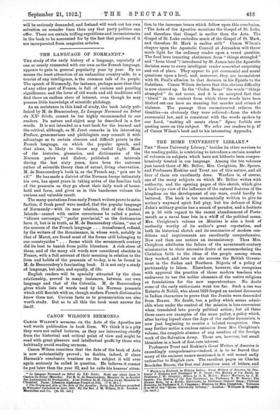THE LANGUAGE OF NORMANDY.* .
THE study of the early history of a language, especially of one so nearly connected with our own as the French language, appears to gain in general popularity year by year. By no . means the least attraction of an unfamiliar country-side, to a tourist of any intelligence, is the common talk of its people. The speech of Normandy, for instance, perhaps more than that of any other part of France, is full of curious and puzzling significance, and the lover of old words and old traditions will find there an endless store of interest, even though he may possess little knowledge of scientific philology.
As an assistance in this kind of study, the book lately pub- -
lisped by M. de Beaucoudrey, Le Langage Normand au Debut du IX' Sacle, cannot be too highly recommended to our . readers. Its nature and object may be described in a few
• words. It is not intended as a text-book for the learned and the critical, although, as M. Joret remarks in his interesting . Preface, grammarians and philologists may consult it with advantage as to certain obscure and difficult points in the French language, on which the popular speech, and • that alone, is likely to throw any useful light. Most of the histories, glossaries, and dictionaries of the
• Norman patois and dialect, published at intervals during the last sixty years, have been the outcome rather of scientific theory than of actual, living observation. M. de Beaucoudrey's hook is, as the French say, " pris stir le cif." He has made a district of the Norman bocage intimately his own, has spent years in taking notes of the familiar task of the peasants as they go about their daily work of house- hold and farm, and gives us in this handsome volume the curious and valuable result.
The many quotations from early French writers prove to satis- ' faction, if fresh proof were needed, that the popular language of Normandy—with its near relation, that of the Channel Islands—cannot with entire correctness be called a patois, "idiome corrompu," "parler provincial," as the dictionaries have it, but is in truth, as M. de Beaucoudrey claims, " one of the sources of the French language . . . transformed, refined, by the writers of the Renaissance, in whose work, notably in that of Marot, are found most of the forms still belonging to our countrysides " . . . forms which the seventeenth century did its best to banish from polite literature. A rich store of these, and of the many old words now considered obsolete in France, with a full account of their meaning in relation to the lives and habits of the peasants of to-day, is to be found in If. de Beaucoudrey's fascinating book. It is not only a study of language, but also, and equally, of life.
English readers will be specially attracted by the close relationship, proved in many instances, between our own language and that of the Cotentin. M. de Beaucoudrey gives whole lists of words used by his Norman peasants which still flourish with us, though modern French dictionaries know them not. Curious facts as to pronunciation are also worth study. But as to all this the book must answer for itself.










































 Previous page
Previous page